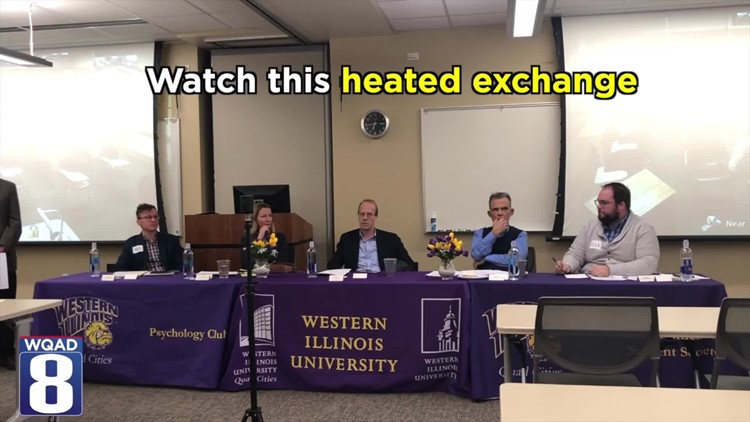On Monday, February 18, a panel of five people with different backgrounds came together to discuss one of the hottest topics in our culture today, political polarization.
Chris Carpenter, Ph.D., a professor at WIU moderated the discussion. The panel was comprised of:
- Ed Tibbetts– Editorial Page Editor of the Quad-City Times
- Alan Sivell– Assistant Professor of Journalism at Saint Ambrose
- Matt Beck– Assistant Professor of Counseling Education at Western Illinois University Quad-Cities
- Tracy Leone– Union Business Agent with Teamsters Local 238
- Alex Turkmani– Pastor of the First Baptist Church of Silvis
Here are two questions from the panel that sparked discussion
Q- Cultural Commentators frequently point to the current political climate as being the most polarized in generations. Has this been your experience?
Ed: Previously I was a political reporter, since the early '90s. I guess what strikes me is yes there's been more polarization but what strikes me is the intensity.
Alan: I've been a reporter for 15 years I've been a teacher for 30. People realize something is going on and want to talk about it which is a good sign...
Matt: Being in my younger 40's, I've seen these types of conversations being more polarized in the classroom. We really have to prepare( students) to be able to engage in these difficult conversations. In my experience, these have been more divisive conversations...
Tracy: Since I've been working with organized labor for, since 1997, I have to say it's not just republican vs democrat, in terms of labor vs management yeah that's gotten a lot more polarized. We used to have decent conversation but now as I attempt to negotiate increasingly I just get the door shut...
Alex: Yeah if you look at any social media feed, you're gonna see some serious polarization, but it's not only party lines if you speak moderately in your own party or criticize a candidate you're seen as an other. The stakes are so high in this battle that's going on that if you appear anywhere near the middle of the right or left then you're seen as an outsider...
Q- People have pointed to various reasons for polarization, including political correctness, rapid shifts in cultural, social media use, and other causes. What do you think accounts for the current state of affairs?
Ed: I've been in this business a long time, I see reporters weighing in with their opinion often without the benefit of time, and they get themselves into trouble...
Alan: After a shooting at a synagogue I wanted to have a discussion with my class of 24, none of them knew what I was talking about...
Matt: The lack of putting yourself in somebody else's shoes...
Tracy: There's also a lot of money and power and corporate power and they fund think tanks and these tanks come up with a lot of talking points and they churn it out there...
Alex: I think we really need to understand what social media has done to this issue, we have a 24-hour news cycle constantly taking in this information...



